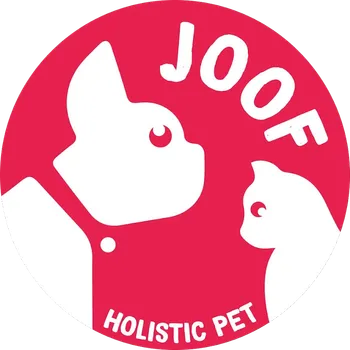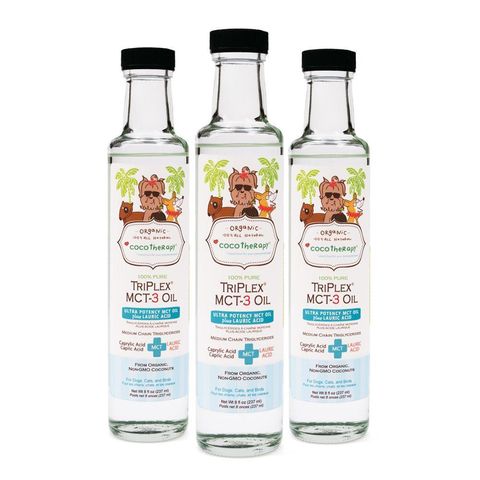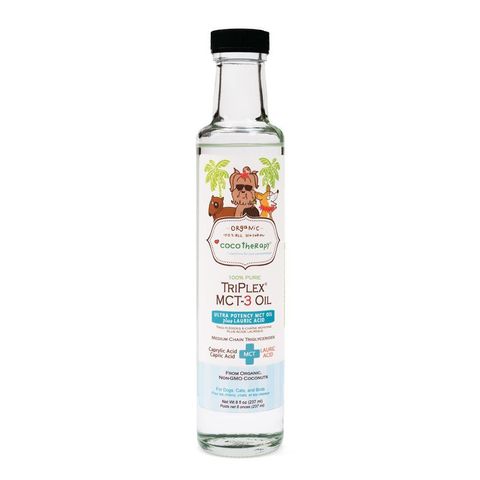
Recommended Article #29Dec24
Hi, Pet Parents Resources is a platform, where we share with you, what we research as pet parents ourselves. Here, we curate and give, what we hope would be, interesting to important informative articles, videos and even podcasts from our brand creators, experts, researchers, and more all over the world, to aid you in making better choices for your pets.
This recommended article "Can MCT Oil Help Manage Seizures in Pets?" is curated and sourced from CocoTherapy. If you loved this article, please do feel free to share it around.
Can MCT Oil Help Manage Seizures in Pets?
Epilepsy and seizures can be challenging conditions for pets and their families, but studies have shown that medium-chain triglyceride (MCT) oil offers a promising way to help manage these neurological issues. With its unique ability to support brain energy, reduce inflammation, and improve overall neurological health, MCT oil has become a valuable dietary addition for pets that suffer from seizures.
In this post, we’ll dive into the research on MCT oil for pets with seizures, exploring how it works and its potential benefits. Plus, we'll take a look at why CocoTherapy TriPlex MCT-3 Oil is an excellent choice for pet parents looking to support their furry friend’s health naturally.
What Does the Research Say About MCT Oil for Pets with Seizures?
The science behind MCT oil’s benefits for pets with seizures continues to grow, with multiple studies highlighting its potential to reduce seizure frequency and improve neurological function. In this section, we'll highlight three studies that provide clear evidence supporting the use of MCT oil to help manage seizures in pets.
Study 1: MCT Oil and Idiopathic Epilepsy in Dogs
One of the most important studies on MCT oil and seizures was conducted in 2020. Researchers followed 22 dogs with idiopathic epilepsy that were already taking anti-seizure medications but still having frequent seizures. Twenty-one dogs completed the full 84-day trial on an MCT-enriched diet, and the results were very encouraging:
- 32% reduction in overall seizure frequency. On average, dogs experienced fewer seizures per month.
- 42% reduction in seizure days per month. Pets enjoyed more days free from seizure activity.
- 9.5% of dogs became completely seizure-free. Two out of the 21 dogs didn't have a single seizure during the study.
- 42.9% of dogs showed a 50% or greater reduction in seizures. Nearly half the dogs saw their seizures cut at least in half.
- 76.2% of dogs had fewer seizures overall. Most dogs in the study benefited from the MCT-enriched diet.
This study highlights how adding MCTs can make a real difference for dogs with epilepsy. It’s a natural approach that can help reduce seizures and improve quality of life, especially when combined with traditional treatments.
Study 2: MCT Supplementation and Brain Energy in Alzheimer’s Disease
In a 2018 study published in The Journal of Alzheimer’s Disease, researchers investigated the effects of MCTs on brain energy in Alzheimer’s patients. The results were fascinating and, importantly, have implications for pets with epilepsy.
Although this study focused on humans, the same metabolic principles apply to other species, meaning that improved ketone utilization could also support pets with neurological conditions like epilepsy.
Ketones derived from MCTs doubled brain energy availability, providing a vital alternative energy source for brains struggling to use glucose effectively – a hallmark in both epilepsy and Alzheimer’s. This improved energy metabolism is believed to play a role in reducing the severity and frequency of neurological symptoms.
Study 3: Reducing Seizures in Dogs with Drug-Resistant Epilepsy
Another 2020 study focused on dogs with drug-resistant epilepsy. Dogs in the trial were given a daily MCT oil supplement, while others received olive oil. The results showed that:
- 71% of dogs on MCT oil had reduced seizure frequency.
- 48% experienced reductions of 50% or more in seizure frequency.
- 14% became completely seizure-free.
This study reinforced the idea that MCT oil could provide a valuable dietary tool for managing epilepsy, especially in cases where traditional medications alone aren’t effective.
How Does MCT Oil Help with Seizures?
MCT oil offers unique benefits that can help support pets with seizures and improve their quality of life. Here’s how it works:
Alternative Brain Energy Source
MCTs are converted into ketones, which act as a backup energy source when the brain struggles to process glucose effectively. This alternative fuel source is particularly beneficial for epileptic pets because glucose metabolism issues are often linked to seizure activity.
Ketones provide a steady and reliable source of energy, helping stabilize brain function and reduce the risk of seizures. Studies have demonstrated that ketone availability correlates directly with improved neurological outcomes, including reduced seizure frequency.
Blood-Brain Barrier and Brain Ketones
One of the standout benefits of MCT oil is that the ketones it produces can cross the blood-brain barrier, directly supporting brain health. Medium-chain triglycerides, particularly lauric acid, elevate brain ketone levels, providing energy that can reduce inflammation and support cognitive function.
Research has shown that lauric acid not only supplies energy but also has antimicrobial properties, helping protect the brain from potential infections.
Lauric acid is especially unique because it’s metabolized in two stages: first by the liver into ketones, and later directly in the brain itself. This dual pathway ensures both quick and sustained energy availability, making it an ideal choice for pets with neurological conditions.
Anti-Inflammatory and Neuroprotective Properties
Inflammation in the brain is a major contributor to epilepsy and other neurological disorders. MCT oil’s anti-inflammatory properties help reduce swelling, which is a common trigger for seizures.
Additionally, its antioxidant effects protect neurons from oxidative damage, supporting long-term brain health. These benefits are particularly important for older pets, as they face increased oxidative stress as part of the aging process.
Why Choose CocoTherapy TriPlex MCT-3 Oil for Your Pet?
CocoTherapy TriPlex MCT-3 Oil is specifically formulated to maximize the benefits of medium-chain triglycerides. Its blend of caprylic acid, capric acid, and lauric acid provides both quick and sustained energy, making it especially effective for pets with seizures.
Caprylic and capric acids are rapidly metabolized by the liver, providing a quick source of ketones to elevate blood ketone levels. Lauric acid offers slower, more sustained energy, ensuring long-term support for brain health. Together, these three MCTs work in harmony to provide comprehensive neurological support.
TriPlex MCT-3 Oil is also a versatile supplement that supports overall vitality. Its additional benefits include promoting healthy digestion, reducing inflammation, and enhancing immune function – all essential for pets with chronic conditions like epilepsy.
How to Incorporate MCT Oil Into Your Pet’s Diet
Ready to add MCT oil to your pet’s diet? It’s a great idea, but it’s essential to introduce it gradually to ensure your pet adjusts well. Here’s what you need to know to get started:
- Talk to your vet first. It’s always a good idea to check with your veterinarian before making any big changes to your pet’s diet, just to be sure MCT oil is the right fit for their unique needs.
- Start with small quantities. Begin by giving your pet a small amount of MCT oil – about one teaspoon for smaller dogs or two teaspoons for larger breeds. Slowly increase the dosage over time, watching for any signs of digestive discomfort. Most pets tolerate MCT oil well when introduced properly.
- Mix with meals. MCT oil can be easily added to your pet’s regular meals. Whether it’s kibble, wet food, or a homemade diet, a drizzle of MCT oil enhances the nutritional value and supports your pet’s brain health.
- Use as a daily supplement. MCT oil not only helps with seizures but also supports energy levels, digestion, and immune function. That's why many pet parents make it a part of their pet’s daily routine for long-term wellness.
Could MCT Oil Be the Key to Managing Your Pet’s Seizures?
For pets living with neurological conditions like epilepsy, MCT oil can offer a gentle, natural way to help calm the brain and reduce seizure activity. It provides an alternative energy source for the brain, eases inflammation, and supports overall neurological health. Together, these benefits may help create a more balanced environment that leads to fewer seizures and a happier, healthier life for your furry friend.
The good news is, you can purchase CocoTherapy 100% Pure TriPlex MCT-3 Oil from our retailers today!
______________________________________________________________
You may find more interesting reads from JOOF Holistic Pet today! Look out for loads of information on our product pages, social media, especially our Pet Parent Resources page.
JOOF Holistic Pet, a Singapore online pet store that focuses on the holistic well-being of your beloved furkid. Our recommended products aim to support and improve health, emotional and physical well-being, and help your pet have a better quality of life without compromise. Look out for Essential, Trendy and Premium quality pet products that are specially curated, with the pet parents concerns' as a priority.
This blog first appeared on the CocoTherapy website, where this article "Can MCT Oil Help Manage Seizures in Pets?" was curated and sourced from.
Original source: Can MCT Oil Help Manage Seizures in Pets?
Thank you for reading! We hope to bring you more informative and exciting articles from other resources and our varying retail brands. Through them, we hope more and more pet parents could become their pet's wellness heroes, proactively taking control of their pets’ foundational health from within, with JOOF Holistic Pet - www.joofholisticpet.sg 😊
_____________________________________________________________
Disclaimer:
JOOF Holistic Pet has curated and reproduced this article in good faith, which may contain an element of consumer opinion, but cannot be held responsible for any information inaccuracies in it or any use assumed from this information by the reader. JOOF Holistic Pet welcomes positive recommendations for holistic healthcare products, but does not necessarily endorse the author’s opinion. We acknowledge each animal is an individual and may react differently to the highlighted product/s, and that there may also be other similar effective products available.
General recommendations made by JOOF Holistic Pet are solely for informational and educational purposes, and are not a substitute for the appropriate veterinary care. It is important to always consult professional help if you have concerns about your furkid’s health.


